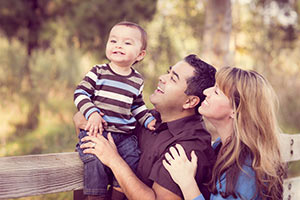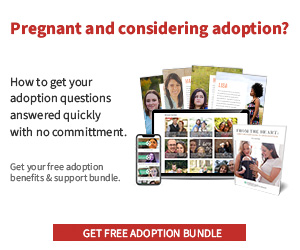ADOPTION IN
Michigan

Whether you’re considering placing a baby for adoption or hoping to adopt a child into your own forever family, an adoption agency in Michigan will be one of your best resources for support. The adoption process in Michigan can differ from other states, so working with professionals and getting all the information you can up front is in your best interest.
Adoption Near Me

Considering Placing Your Baby or Child for Adoption? You can learn more here or call an adoption counselor 1-800-236-7898.
Domestic Infant Adoptions can be completed through a Michigan adoption agency or adoption attorney. Click here for a directory of adoption service providers in Michigan.
International Adoptions must be completed through adoption attorneys and agencies for international adoption. Find an international adoption service provider here.
Foster Care Adoptions in Michigan can be completed through the Department of Health and Human Services MARE program (800- 589-6273).
Gallery of children waiting to be adopted.
Join the Michigan adoption group in our community!
Looking for more resources in your area? Check out the Adoption Directory for a listing of adoption professionals in your state.
I’m considering placing my baby or child for adoption.
Pregnant and have questions? We can help answer your questions by telling us what works best for you.
Are you pregnant and considering adoption? Do you need help getting started?
Click here and help us understand what your needs are and the preferences you have. We can help you get started.
Adoption in Michigan
By: Rebekah Yahoves
An unexpected pregnancy can be quite a shock. If you are like most people, you may be feeling confused, anxious, and even a little excited.
You may be considering all of your options, and wondering how you can best prepare for your own future, as well as that of your child. The decision to make a plan for adoption in Michigan is not necessarily an easy one. It requires a little selflessness, a lot of courage, and a bundle of faith.
Here are some things you should be considering if you call Michigan your home:
Deciding If You Are Ready to Make an Adoption Plan
Making an adoption plan for your child is a life-changing decision, and you should not make it without a great deal of thought, consideration, and prayer.
Reasons for adoption plans are varied, and none of them are wrong. You may be in school and not ready for the responsibility of a family, or you may not have a place to live and be worried about your baby’s safety. Some women are in abusive relationships, and parenting a child would not be a responsible choice.
You will need a lot of support before you are ready to make your decision. Many pregnancy centers can offer support through counseling and financial assistance by providing material assistance in terms of food, clothing, medical care, etc.
You may want to look for a counselor on your own or find one through your house of worship. Or you may have friends or family who are offering you lots of hope and support. If you are not getting the kind of compassion you need locally, some counselors or social workers may be willing to work with you remotely. There is also an abundance of books, podcasts, and free seminars that can help you find peace during a difficult time. Local pregnancy centers may be able to recommend or provide free counseling to expectant mothers.
Your decision mustn’t get made lightly. Weigh the pros and cons by writing them down. Discuss it with those you trust, and keep praying if you are a religious person. Try to focus on the hope you have for your future and your ideal relationship with the child you are bringing into the world.
When you are ready to begin partnering with an adoption agency to find the right family, you will want to be confident that you have approached the decision with as much thought and consideration as possible.
Different Types of Adoption in Michigan
Infant adoption is the most common form of adoption in Michigan. If this is the option you are considering, you can contact a local adoption agency that will work directly with you throughout the process.
Here are some popular adoption agencies in Michigan. These agencies will walk you through creating your adoption plan, choosing an adoptive family, and building your adoptive parent/birth parent relationship, if that is what you want.
Many agencies will also provide financial help for you before your pregnancy and for a period of time after. Your needs may include medical care, housing, clothing, and food. You may also require transportation and counseling. All reasonable expenses can be reimbursed.
You may also wish to speak to an adoption attorney, who can make arrangements with prospective adoptive families on your behalf. Similar arrangements can be made for financial assistance during your adoption. You will have a lot of freedom when it comes to choosing a level of communication.
Michigan has state and court ward adoptions available, as well as stepparent and relative adoptions. The type of adoption you choose will depend on the type of future you envision for your child.
Consenting to Adoption in Michigan
Parental consent to an adoption in Michigan must be done before a judge. You are required to have full information about your legal rights. Consent must be given by each living parent or guardian. You will also need consent from the child-placement agency you are working with, as well as the court. The child must consent to the adoption if he or she is 14 years old or older.
When you consent to place your child up for adoption, you will sign a document that states that you have received information regarding support groups, attended free counseling (or waived your right to counseling services), and have not been offered anything in return for relinquishing your parental rights.
Making a Plan for Adoption in Michigan
You will meet with your adoption agency to discuss a plan before you place your child, and you will also be able to talk about your ideal adoptive family, as well as the type of contact you want to have with the parents and your child.
Most adoptions today are open. This means that you will be exchanging identifying information with the adoptive family and can maintain some form of contact with them throughout your lifetime. Communication can range from texts to phone calls to in-person visits. Your adoptive family and agency can work on developing an arrangement that is comfortable for you. Often, adoptive families are involved in the hospital experience, but it is absolutely up to you to decide what you are comfortable with.
Semi-open adoptions are also common. Communication with these types of adoptions can be less face-to-face, involving letters, emails, and phone calls that may or may not lead to in-person visits. Often, birthdays or holidays are times when updates and photos are exchanged. The adoption agency acts as an intermediary for communication. Sometimes, semi-open adoptions become more open as a relationship develops.
In a closed adoption, no identifying information is exchanged except for maybe medical history. In the past, most adoptions were confidential. Currently, however, closed domestic adoptions are rare.
Choosing an Adoptive Family
Adoption agencies are often working with hundreds of hopeful adoptive families at a time. Many will create print or online profiles that you can look through to get an idea of what their values are and how they interact.
Keep in mind that families are required to pass background checks, medical exams, and reference checks before they reach the point of creating a profile for birth mothers to view. You may, however, find yourself with many options to choose from.
Consider how long the couple has been married and what their views are when it comes to lifestyle, values, and religion. You may want to think about their level of education and the living conditions near their home. For example, you may see your child growing up in a rural environment with lots of space to run and play or a city with plenty of culture and opportunity.
Look into the hobbies, goals, and interests of the parents you are considering. Some birth parents are drawn to the sports goals of particular families. Others are looking for adoptive families with similar traditions such as Italian Christmases or Hebrew Passover celebrations.
It is okay to ask about a prospective family’s philosophy on discipline and their plan for saving for a child’s college education. If the couple has a close extended family, find out more about them, especially if your child will be spending a lot of time with them. An adoptive couple may also be able to talk to you about the type of future they envision for their family.
Your plans for openness in communication should be clear to prospective adoptive families before you begin the process. The right family will be able to work with you to layout a plan that will work amicably for everyone involved.
Get to Know Your Adoptive Family
You will be communicating a lot with your child’s adoptive family throughout the birth and adoption process, so it is important to maintain a positive relationship. Your focus should be on what is best for the well-being of your child.
Establishing the rules may feel uncomfortable at first, but it is critical to make them clear at the beginning to maintain a positive relationship.
Communicate throughout the pregnancy, as well as during and after birth. The relationship will be much easier to maintain if it has already been established. It may also help to send your child’s adoptive parents encouraging messages as you will both be working hard for the safety and well-being of your child.
Avoid getting into arguments with your child’s adoptive family about issues that are of lesser importance such as a gift that you may feel is too extravagant. Instead, keep your conversations focused on the needs of your child, his or her progress, and your mutual hopes and aspirations for the future.
Make a Hospital Plan
You will develop a birthing plan before you deliver that will suit your needs. If you are making an adoption plan, however, there will be other factors to consider. You may, for example, wish to have the adoptive family in the room when you give birth. Or you may plan to have some time alone with your child. Consider whether or not feeding the baby will be a part of the hospital experience.
In the state of Michigan, your adoption will not be finalized until the court reviews your request. If you have given an out-of-court request, you have up to five working days to revoke your decision.
Maintain a Positive Relationship
Maintaining a positive relationship is critical as you go forward. Stick with your prearranged communication plan, and focus on your child’s well-being.
Expect your updates to include information about your child’s milestones, friends, and celebrations. They may include pictures. These times may always bring on a flood of emotions, and that is normal. You may find yourself processing your feelings with a trusted friend or counselor for some time after your adoption. Lean on as much support as you need at the beginning, and you may find the updates get easier to read as time goes on.
Moving Along
Your child will always be in your heart. He or she may even be part of your schedule if in-person visits were part of your adoption plan.
The important thing to remember is the plans you made when you started your adoption journey. Maybe you are finishing school, starting a business, or still searching for the right person to share your romantic life with. Keep yourself busy by taking steps toward your goals and using your time productively. Your plans should be realistic and within reach. Regular exercise such as walks, yoga, and gym visits can help you stay positive and emotionally healthy.
Take your life day by day and concentrate on the picture you have for your future. You may hope to become friends with your biological child sometime in the future, even if you are not meeting with him in person now. Believe that there is a divine plan for every life, and your adoption experience will make you stronger, more resilient, and more compassionate.
If sadness, anger, and confusion overwhelm you from time to time, you may consider going back to your counselor or finding a new one. Some pregnancy centers may provide this service for free for up to two years after the adoption. Additionally, you may be covered through your healthcare plan or house of worship.
You will want to communicate with those you trust regularly. If you don’t have a support system, join a small group or find an online support network for birth mothers. You may be surprised at how many have experienced the same emotions as you and got through them beautifully. Some might even live in your area and be available for coffee or a meetup.
Deciding to make an adoption plan for your unborn child is bold, selfless, and compassionate. You will need to decide with great care and thought.
After you have chosen an agency and adoptive family, however, you will begin to see a plan developing for your child’s life as well as your own. With a little tact and planning, you can strive to build a positive relationship with your child’s adoptive family and an excellent future for your child.
As you see your future unfolding, you can embark on a journey that is unique and beautiful, and meant to be.
Michigan Adoption Guide
The information contained on this website is for educational purposes only and is not intended to be a substitute for professional legal advice. Always seek the advice of a licensed and qualified professional. While the content of this website is frequently updated, information changes rapidly, and therefore, some information may be out of date, and/or contain inaccuracies, omissions, or typographical errors.
Can I Adopt in Michigan?
Applicants can be single, married, or divorced. You can own or rent a home. Parents need to be at least 18 years old in order to foster or adopt. While adoptive parents do not need to be rich, they need a stable income to support a growing family. Applicants must be in good mental and physical health. Members of an adoptive household must be in good health as well. Parents need to provide 3 professional references. Adoption training classes may be required in order to become a foster/adoptive parent. For a more complete list of adoption FAQ, visit michigan.gov.
What Adoption Regulations Exist in Michigan?
Advertising: Adoption facilitators in Michigan are defined as licensed adoption agencies and attorneys. These two professionals may distribute pamphlets highlighting their services offered. They must present interested parties a written document including the following: the types of adoptions they handle, the services they provide, eligibility requirements for adoptive families, the procedure used to select adoptive parents for the child (in agency adoptions), amount of contact between families after adoption finalization, and a schedule of all fees. § 722.124b(c)-(d); 722.956
Relinquishment: When a father refuses to consent to adoption for children born out of wedlock, adoption consent from the mother can be taken at any time pending the termination of the father’s parental rights and request for custody of the child. Consent cannot be executed until a judge or other authorized individual explains to the parent or guardian the parental rights and that consent permanently terminates those rights. If consent from a child is required, consent cannot be executed until an authorized individual explains to the child that their consent to acquire permanently an adoptive parent is as though they were legally born to that parent. Any person who grants consent may petition the courts to revoke consent up until the child is placed for adoption. After placement, parents may revoke only if an appeal for termination of parental rights is pending, and a petition for a rehearing has been filed within the appropriate time. § 710.31; 710.44; 710.29
Birth parent expenses: Adoptive parents may pay reasonable charges for the following: medical, hospital, pharmaceutical charges for the birth mother/child in connection with the pregnancy, counseling charges for birth parent or child, living expenses before birth and up to 6 weeks postpartum, adoption related traveling expenses. § 710.54(3), (5)
Post-adoption contact agreements: Contact agreements are not legally enforceable in Michigan.
Birth father rights: While no putative father registry exists in Michigan, unmarried fathers can take alternate steps to establish paternity. Before the birth of the child, father’s can file with any court in Michigan a notice of intent to claim paternity. As long as the mother does not deny the claim, the father becomes a presumed father and has the right to receive notice of adoption proceedings. The unmarried father may also sign an acknowledgement of paternity along with the birth mother. § 710.33; 722.1003; 722.1004
Finalization: The child must live with hopeful adoptive parents for at least 6 months before adoption finalization.
Is Adoption Assistance Available in Michigan?
Can I adopt a Child from another country?
It is always possible to adopt a child from another country, even if you live in the United States. Children under 18 adopted from a Hague Convention country entering the U.S. with an IH-3 visa may automatically receive U.S. citizenship.
Children adopted from a non convention country must qualify as orphans before receiving U.S. citizenship. When U.S. citizens finalize an adoption abroad, they must apply to the USCIS for an IR-3 visa for the child. An IR-3 visa classifies the child as an immigrant and provides the child with citizenship upon arrival in the States.
A court order of adoption completed in another country is presumed to be issued in accordance with that country’s laws and is recognized in Michigan as though a Michigan court completed the order. § 710.21b
State Contacts
Gallery of children waiting to be adopted: https://adoption.com/photolisting?page=1&search_type=region&range=UnitedStates
State subsidy contact:
Dawn Ritter, Adoption Subsidy Manager
Michigan Department of Human Services
235 S. Grand Ave, Ste 412
Lansing, MI 48909
Phone: 517-241-6849
Fax: 517-335-4019
Email: RitterD@michigan.gov
Summary
Adoptions in Michigan can be completed through the Department of Health and Human Services MARE program.
Applicants can be single, married, or divorced. You can own or rent a home. Parents need to be at least 18 years old. Adoption agencies and attorneys may distribute pamphlets highlighting services offered.
For children born out of wedlock when a father refuses to consent to adoption, adoption consent from the mother can be taken at any time pending the termination of the father’s parental rights and request for custody of the child. Parents may revoke consent up until the child is placed for adoption.
Adoptive parents may pay reasonable charges for the following: medical, hospital, pharmaceutical, counseling, and living expenses before birth and up to 6 weeks after.
Contact agreements are not legally enforceable in Michigan. While no putative father registry exists in Michigan, unmarried fathers can take alternate steps to establish paternity.










